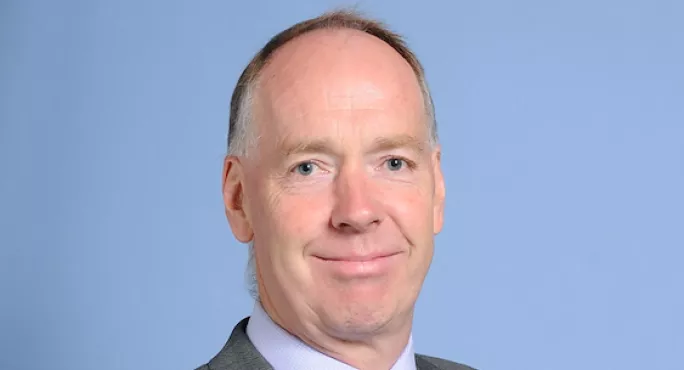- Home
- Meet Kevin Gilmartin, ASCL’s post-16 specialist
Meet Kevin Gilmartin, ASCL’s post-16 specialist

“When I was younger, I had a decision to make: either become an accountant or become a teacher. I always had this thing about teaching because I had such a good time at my own school, and got on so well with my teachers,” say Kevin Gilmartin.
“My family, we didn’t have doctors, lawyers, accountants as role models; we didn’t have friends who were in those circles. It was my teachers who were my role models.”
Gilmartin went on to have a successful 30-year career in teaching, holding several leadership positions in colleges across London. Today, he supports his role-models-turned- colleagues as the post-16 specialist at the Association of School and College Leaders (ASCL).
News: 70% of college leaders opposed to public-sector control
More: 4 in 10 college leaders ‘not confident about finances’
Exams 2021: Why teachers need to know the rules now
A degree apprenticeship
Gilmartin was born in Hammersmith in West London to Irish parents who came to England in the 1950s. He grew up in Hayes and went to a “lovely, little, local” primary school with a “strong sense of community”. When it came to secondary education, his experience was a little different. He took the 11-plus and went to a large boys’ grammar school in Harrow until the age of 18.
He says that he loved school - but his priority was always sport: tennis, football, long-distance running. He even represented Great Britain in the Catholic Schools’ Football League, and shared a room with Liverpool legend Ian Rush. He toyed with the idea of following in Rush’s footsteps and becoming a professional footballer but, ultimately, education won out.
“I think in those days, if you had an education and qualifications, you followed that route,” he says. And so Gilmartin completed his A levels before becoming the first of his six siblings to go to university.
While there, he chose a route that many think of as a recent invention: a degree apprenticeship with Portsmouth Council. “People think degree apprenticeships are new, but actually they have been around for a long time,” he laughs. He worked for the council’s electricity board while attending what was then Portsmouth Polytechnic - and managed to set aside some time to play for the university’s football team.
After completing his degree, he worked for the electricity board for a few months, but found it “rather boring”, and left to work as an accountant at Heathrow Airport. Six months into that job, he had saved enough money to go travelling, and set off around Asia.
It was when he came back that he chose to become a teacher, going on to do his PGCE at the Institute of Education in London. Gilmartin worked at a secondary school in London’s East End for a few years before making the move across to further education.
The glory days of FE
His first college was South Thames College in Wandsworth, where he taught accountancy and business. It was the 1980s, and Gilmartin says that part of the appeal was how well funded FE was at the time.
“I enjoyed working with the slightly older students and it was very well funded in the ‘80s prior to incorporation in the ‘90s. It attracted a higher calibre of staff because of that,” he says.
“We worked very closely with the council across the road, on day releases, evening classes and access programmes. We gave a lot of people a second opportunity, and I really enjoyed that aspect as well. It was fantastic to work with people like that.”
In the early 1990s, he decided to return to learning himself, and did a masters in vocational education and training at the IoE. That led to a job at East Berkshire College as head of the businesses department. In his time there, the college went through corporation.
“A lot of the colleges took on a rather macho leadership style because they had a lot of power and a lot of control over raising their own finances. There were positives, but I think there was some very bad, quite aggressive behaviour in terms of relationships with the staff and students, and it was a bit of chasing the buck for a while before it settled down,” he says.

He went on to become the deputy head and then principal at William Morris Sixth Form in Hammersmith during the “glory days” of the early 2000s. Gilmartin says that, technically, it was the first 16-19 school in the country, with teachers being paid under school conditions. And when it came to the students, it was “incredibly inclusive”.
2012 was a tough year for Gilmartin and for the college - a drop in funding meant he had to do a restructure, make a lot of staff redundant, create bigger class sizes and cut back on options.
It was during that time that Gilmartin began to be “seriously impressed” with ASCL - and when he decided to leave teaching a few years later, it seemed like an obvious move.
“I thought, you know what, 30 years in education is not a bad old go. And when the job came up, I thought being the post-16 national specialist for an organisation I really respected was the dream job,” he says.
Being a friendly face
And it’s a job to which Gilmartin brings a plethora of experience. He says he feels his members’ pain when having to make the tough decisions, and relies on his decades of teaching to offer the best advice. He’s had the role for five years now and says he’s had a brilliant time at “a fantastic organisation”.
Gilmartin says that it’s a challenging time for leaders, but that he’s really proud of ASCL’s role in raising the base rate of 16-18 funding, which he says is still not enough, but has made things “not as bad as they have been”. Going forward, he says that the union will be fighting to prevent performance tables being published, saying it would be “crazy” if they were.
He says he is worried about leaders’ mental health.
“Covid and the summer results this year in 2020 - you hope it’s a one-off, you hope that the level of stress and strain that college leaders have been put under is not going to be the same next year. It’s been quite frightening how much leaders have had to work. I spoke to some last weekend, and they just look so tired. I really worry about the members being back at college after basically working all summer,” he says.
“This year for us, it may be that it’s less about support in terms of funding, data and accountability and actually is more about sort of the mental health support for our members and giving them someone to talk to, somebody who understands. You know, a friendly face who may have some ideas about what’s important and what’s less important in decision making.”
And luckily for college leaders across the country, Gilmartin certainly ticks all of those boxes.
Keep reading for just £1 per month
You've reached your limit of free articles this month. Subscribe for £1 per month for three months and get:
- Unlimited access to all Tes magazine content
- Exclusive subscriber-only stories
- Award-winning email newsletters



